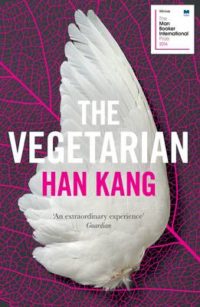She selfishly did as she pleased
 The Vegetarian
The Vegetarian
by Han Kang
translated from Korean by Deborah Smith
As you’ll have noticed, I have been watching a lot of South Korean TV shows this year. It all started with a random Netflix recommendation, and I enjoyed that first taste so much that I immediately asked for more suggestions on Twitter. Naturally, all that screen time has got me curious about life in modern Korea, so it seemed about time that I picked up a book or two by Korean writers.
This Korean novella was a huge deal when it was released in English, winning the Man Booker International Prize in 2016. It’s an odd book and provoked a strong reaction in me, but I’m still trying to pin down what that reaction is exactly.
Yeong-hye has always been a dutiful, if dull, wife – until the day she stops eating meat. This angers her husband and family far more than it seems to merit, and they question her mental health, while she blames it on a recurring dream. Where the story goes from there either means being vegetarian in Korea is a seriously radical act, or that Yeong-hye’s decision is a symptom of something else – whether it’s marriage problems, nightmares or indeed her mental health.
“Long bamboo sticks strung with great blood-red gashes of meat, blood still dripping down. Try to push past but the meat, there’s no end to the meat, and no exit. Blood in my mouth, blood-soaked clothes sucked onto my skin…But the fear. My clothes still wet with blood…My bloody hands. My bloody mouth. In that barn, what had I done?”
Yeong-hye is not happy in her marriage. The way her husband treats her after she stops eating meat is abusive in every way, yet he is the one her family sides with. To add an extra dimension of disturbing, the first of the three sections of the book is narrated by her husband, so we hear his perspective and justification for his abuse.
Yeong-hye’s health deteriorates, but is that a result of eating less or is it the abuse? Which came first? Will anyone recognise what is happening to her before her mental health is irretrievably damaged?
“How on earth could she be so self-centred? I stared at her lowered eyes, her expression of cool self-expression. The very idea that there should be this other side to her, one where she selfishly did as she pleased, was astonishing. Who would have thought she could be so unreasonable?”
The edition that I bought has quotes on the cover and a blurb describing it as erotic and sexual. The middle of the three sections could be described that way, but parts one and three are definitely not erotic – the only sex there is rape, and knowing that made those words on the cover seem really misplaced; upsetting even.
This whole book is upsetting – and I’m pretty sure it’s meant to be. For me, it’s not about sex, it’s about control – a woman’s control over her life and body. Or her lack of it. It’s about society closing ranks to cast out anyone who defies the social order, who refuses to follow the norms – particularly if they shout too loudly about it.
I know it’s a good sign to have a strong reaction to a book, to be made angry by it – not because I disagree with something the author is saying, but because the author is depicting something awful that I know really happens. But it’s not a pleasant experience, specifically because it’s so well written.
Chaesikjuuija published 2007 by Changbi Publishers.
This translation published 2015 by Granta.
Source: Storysmith, Bristol.